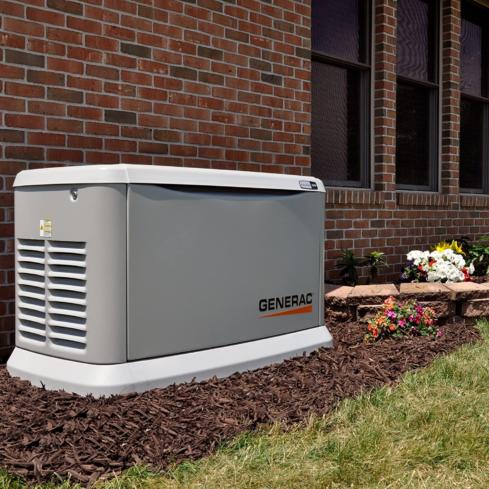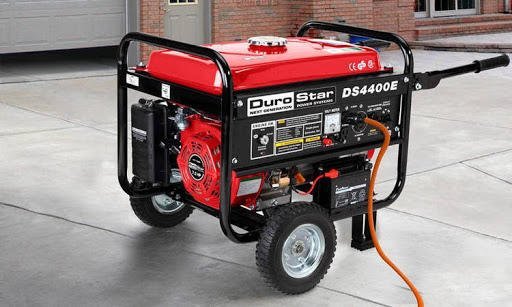


stationary generator
A constant electrical supply is the need of the modern world. Most of our day-to-day lives became dependent on technology, starting from appliances at homes to running big businesses; an interruption in electrical supply can cause minor to major inconveniences. A generator can prevent that, and it can sustain the electrical supply when the power outage hits.
There are many classifications of generators, but, two most common types of generators are stationary generators and portable generators. These generators are different in many ways from each other; they consume different types of fuel, their installation procedure is different, and their starting mechanism is different as well.
Contrary to portable generators, stationary generators stay situated at one place, and it toggles between on and off automatically when the power goes out and when it comes back.
A portable generator is mobile, and you can carry it with you. It will provide the power wherever the need arises. You choose a stationary generator when you only intend to use it as a backup power source for your house or business. Stationary generators can power the whole house.
So, when it comes to making a decision which one should you choose, portable or stationary?
Let’s see.
Situated Or Mobile
The installation of these generators is an important consideration.
Stationary generators will be installed on your premises, and you will need to hire a professional to do that. Moreover, you will also need the help of a plumber to make the gas connection to the unit. There is one more thing you will need to assure before the installation, and you will have to obtain a permit for the installation of a stationary generator.
When everything is done, an inspector from the authorities will come and check whether it is installed according to the codes and in a safe manner. Once the fuel line is connected and installation is done, you won’t have to do anything. It will turn on and off automatically.
On the other hand, a portable generator doesn’t need to be permanently installed anywhere; what it will need is a storage shed. When you need the power, you can take it out, fill the tank, then connect it to the transfer switch, and it will start powering your house once you start it. It can’t be used indoors, and it should be placed at a safe distance.
Cost
When it comes to the cost, stationary generators are costlier than portable generators.
The price of a stationary generator typically ranges from $3,000 to $10,000, this is costly, but you are getting more power. Power enough to electrify a large house. Besides the purchase price, the installation cost also increases the initial price, and the installation cost can be around $5000. Also, a stationary generator will increase the resale value of the property.
A portable generator doesn’t cost that much; besides, there will be no installation costs as well. It is more affordable. They will be priced between $400 to $2000. But to connect it to the house, there will be a cost to install a transfer switch to ensure safe operation.
Working and Tracking Parameters
A stationary generator is better in this regard; it works automatically; as soon as the absence of grid power is detected, the generator will be connected to the house circuits in no time. So, when you are out and the outage occurs, it will keep your fridge running, so the food stays good.
It doesn’t require you to be present, not even to add fuel. It will have a constant supply of natural gas or propane. Moreover, many stationary generators come with the ability to be monitored from your smartphone, and all-important parameters will be transferred to your phone.
Meanwhile, a portable generator requires your presence if you want to start it and power the house. You will need to take it out from the storage, pour in the fuel, connect to the transfer switch and then start it.
It comes with a manual starting. So, if you are on a trip and the power goes out, and if you have a sump pump, then it will stop working, and the home security system will be compromised too.


portable generators
Noise Level
They both are noisy. Portable generators are quite more than standby generators. With portable generators, you can somewhat reduce the noise by placing them at a bit more increased distance, which is not possible with stationary generators. Stationary generators produce less noise, but still, it will be audible throughout the whole house when it runs.
Fuel
Stationary generators run either on natural gas or on propane. Most of the houses will already have an existing connection line of propane or natural gas. So during the installation, you will just have to make a connection to the unit, and it is done.
The continuous flow of fuel through pipes will result in an unlimited runtime; as long as there are no interruptions to your gas pipeline, the generator will run. Moreover, unlike the portable counterparts, a stationary generator won’t require refueling.
While a portable generator requires refueling when blackout persists for a longer period, it will run on gasoline, propane, or diesel. There are also dual-fuel units. The runtime will depend on the load connected and the size of a fuel tank.
Maintenance Requirement
The maintenance needed for a portable generator is not much. To keep it in good shape and have a longer life, make sure that you drain the fuel from the tank before you store it; leftover fuel will lead to a blocked carburetor and other problems.
Moreover, many portable generators come with the fuel shutoff feature. In which the fuel supply will be cut off before it turns off so the remaining fuel can be utilized. Despite that, you should maintain it regularly to have a long life.
On the other hand, a stationary generator requires regular maintenance. They generally run their test run periodically, typically every week, to check if everything is working fine or not. If not, then it will notify you by some kind of signal. Still, you will have to perform regular maintenance once a year.
Summary
After going through these differences, you should be able to make a decision whether you want a standby unit or a portable unit. They both are better at something and not at something else. It all depends on your requirements. So, make a wise choice.
Reference:
https://www.generator-review.com/portable-generator/
https://www.briggsandstratton.com/eu/en_gb/buying-guides/standby-vs-portable-generators.html